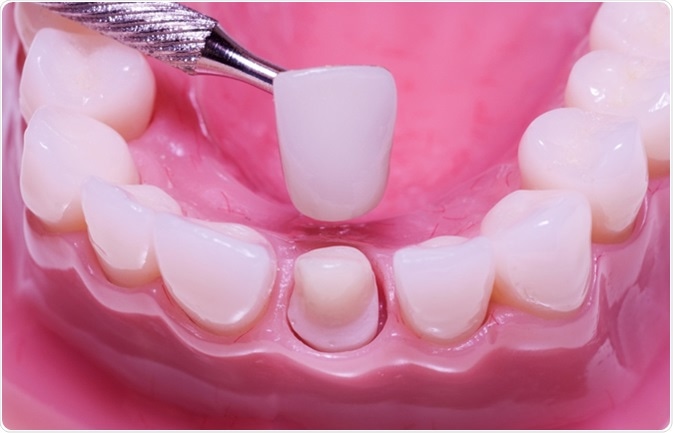A dental crown, also sometimes referred to as a “cap,” is a type of dental restoration that fits over the remains of a tooth to restore the appearance of the natural tooth or to protect it from further damage.

Porcelain Bonded Crown preparation, Bonded Crown. Image Credit: RCB Shooter / Shutterstock
Uses of a Dental Crown
Dental crowns are primarily used to repair teeth that have been damaged in some way. Such teeth may have chipped or been broken or weakened by decay or a filling.
Some reasons to recommend a dental crown include:
- To improve the appearance of a tooth that has been broken or discolored
- to protect the remains of a broken tooth from further damage
- To support a bridge or denture in the mouth
Materials of Dental Crowns
There are various materials that can be used to construct a dental crown, including:
- Precious metal-bonded porcelain: the most common material used for crowns. The base is made of precious metal for increased strength and porcelain is layered over it for improve aesthetics.
- Porcelain: less strong than bonded porcelain but provides a very natural look for appearance purposes, such as capping front teeth.
- Ceramic: a versatile metal-free material that is both strong and can have a similar appearance to porcelain.
- Glass: can be applied anywhere in the mouth for a very natural look.
- Gold-alloy: a traditional material that is very strong but is silver or gold in color.
Procedure and Techniques
Firstly, it is important for the tooth to be adequately prepared and filed into a suitable shape before the crown can be placed. This typically involves removal of the outer surface of the tooth, leaving the stronger inner core intact.
Once the tooth has been prepared, the next step is for an impression or mold of the tooth and the opposing tooth to be made. These impressions are useful for the dental technician to construct the dental crown in the appropriate shape so that it fits over the tooth to be capped and matches well with the jaw on the other side when the individual bites. The dental technician will also need specific information about the natural coloring of the adjacent teeth to improve the appearance of the crown.
Tooth preparation for All-ceramic crown
When the crown to fit the affected tooth has been created, it can be fixed into place with dental cement or adhesive to form a seal that holds the crown in place over the tooth. The procedure is usually painless because a local anesthetic will numb the area.
Given the steps needed to create and fit a dental crown, it typically takes at least two dental visits before it is properly put in place. For this reason, a temporary crown is often made for the patient to provide a cap for the tooth in the meantime.
What is a Post Crown?
In some cases, such as for root-filled teeth, the insertion of a post into the tooth root prior to the crown placement may be necessary. This helps to stabilize the crown and keep it in place, even when there is little of the original tooth remaining.
The post is placed directly into the root canal of the tooth and cemented into position. It may be prefabricated or custom-made by a dental technician, depending on the circumstances.
It may be possible to rebuild a root-filled tooth that is not completely broken down, using only filling material, without the need for a post crown.
Appearance and Results
When constructed and placed with care, a dental crown should match the appearance of the other teeth very closely so that it will appear as natural as possible.
The shape of the crown will differ slightly from the shape of the tooth before the crown was placed, which can make it feel strange for the individual initially. After several days your mouth and tongue will become accustomed to the new shape of the tooth so that it will not be noticeable. In some cases, it may be necessary to adjust the shape of the crown slightly to increase the functionality of the tooth, particularly for the bite.
Appropriate Care for Dental Crowns
It is important to care for dental crowns appropriately to ensure that they last for as long as possible. Although it depends on the type and position of the dental crown, they can generally last for many years when well cared for.
Crowns should be cleaned just as any natural tooth should be cleaned. Although the materials used to construct crowns will not decay, the tooth at the edge of the tooth can. Individuals should be advised to brush their teeth at least twice a day with fluoride toothpaste, and the gaps between the teeth carefully cleaned with interdental brushes or floss.
References
Further Reading
Last Updated: Feb 26, 2019